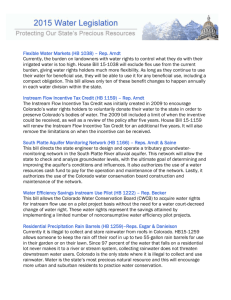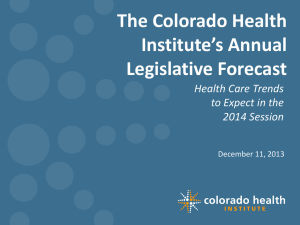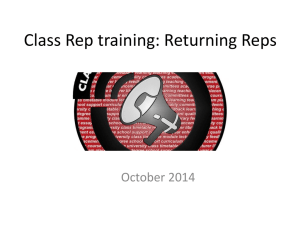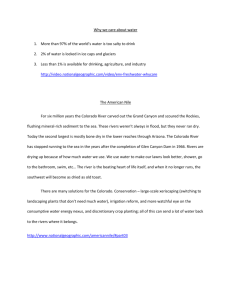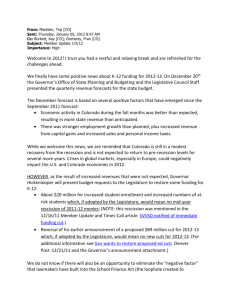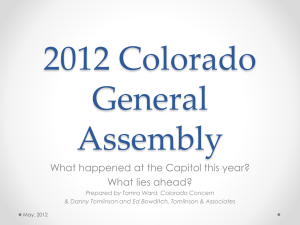Environment EOS 2015
advertisement
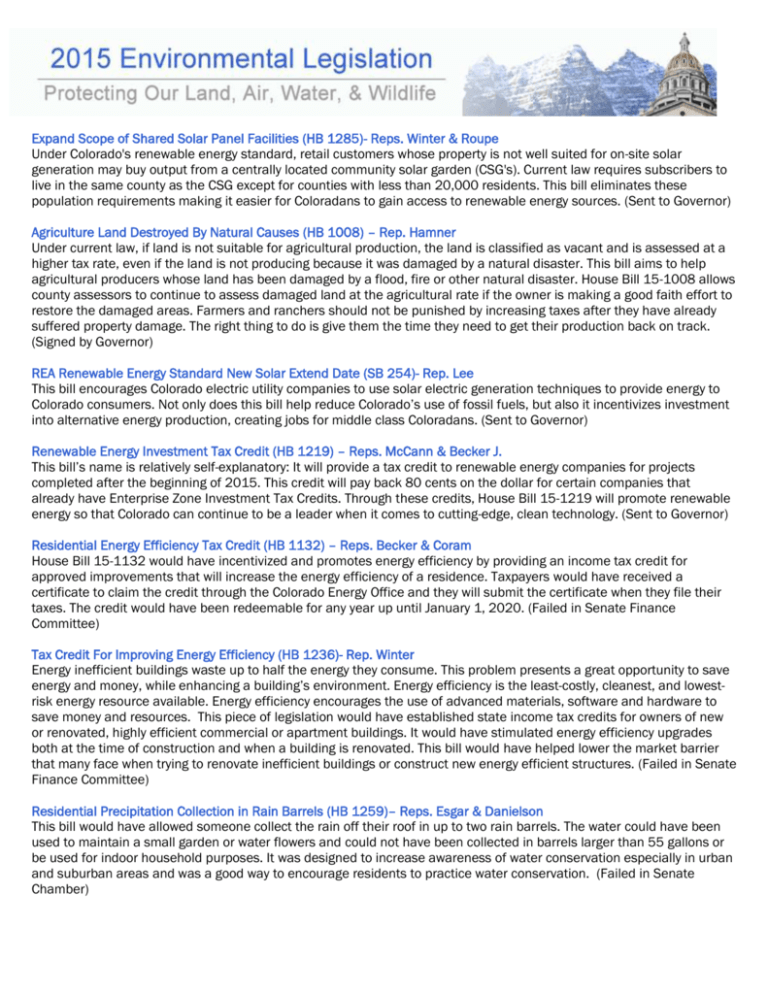
Expand Scope of Shared Solar Panel Facilities (HB 1285)- Reps. Winter & Roupe Under Colorado's renewable energy standard, retail customers whose property is not well suited for on-site solar generation may buy output from a centrally located community solar garden (CSG's). Current law requires subscribers to live in the same county as the CSG except for counties with less than 20,000 residents. This bill eliminates these population requirements making it easier for Coloradans to gain access to renewable energy sources. (Sent to Governor) Agriculture Land Destroyed By Natural Causes (HB 1008) – Rep. Hamner Under current law, if land is not suitable for agricultural production, the land is classified as vacant and is assessed at a higher tax rate, even if the land is not producing because it was damaged by a natural disaster. This bill aims to help agricultural producers whose land has been damaged by a flood, fire or other natural disaster. House Bill 15-1008 allows county assessors to continue to assess damaged land at the agricultural rate if the owner is making a good faith effort to restore the damaged areas. Farmers and ranchers should not be punished by increasing taxes after they have already suffered property damage. The right thing to do is give them the time they need to get their production back on track. (Signed by Governor) REA Renewable Energy Standard New Solar Extend Date (SB 254)- Rep. Lee This bill encourages Colorado electric utility companies to use solar electric generation techniques to provide energy to Colorado consumers. Not only does this bill help reduce Colorado’s use of fossil fuels, but also it incentivizes investment into alternative energy production, creating jobs for middle class Coloradans. (Sent to Governor) Renewable Energy Investment Tax Credit (HB 1219) – Reps. McCann & Becker J. This bill’s name is relatively self-explanatory: It will provide a tax credit to renewable energy companies for projects completed after the beginning of 2015. This credit will pay back 80 cents on the dollar for certain companies that already have Enterprise Zone Investment Tax Credits. Through these credits, House Bill 15-1219 will promote renewable energy so that Colorado can continue to be a leader when it comes to cutting-edge, clean technology. (Sent to Governor) Residential Energy Efficiency Tax Credit (HB 1132) – Reps. Becker & Coram House Bill 15-1132 would have incentivized and promotes energy efficiency by providing an income tax credit for approved improvements that will increase the energy efficiency of a residence. Taxpayers would have received a certificate to claim the credit through the Colorado Energy Office and they will submit the certificate when they file their taxes. The credit would have been redeemable for any year up until January 1, 2020. (Failed in Senate Finance Committee) Tax Credit For Improving Energy Efficiency (HB 1236)- Rep. Winter Energy inefficient buildings waste up to half the energy they consume. This problem presents a great opportunity to save energy and money, while enhancing a building’s environment. Energy efficiency is the least-costly, cleanest, and lowestrisk energy resource available. Energy efficiency encourages the use of advanced materials, software and hardware to save money and resources. This piece of legislation would have established state income tax credits for owners of new or renovated, highly efficient commercial or apartment buildings. It would have stimulated energy efficiency upgrades both at the time of construction and when a building is renovated. This bill would have helped lower the market barrier that many face when trying to renovate inefficient buildings or construct new energy efficient structures. (Failed in Senate Finance Committee) Residential Precipitation Collection in Rain Barrels (HB 1259)– Reps. Esgar & Danielson This bill would have allowed someone collect the rain off their roof in up to two rain barrels. The water could have been used to maintain a small garden or water flowers and could not have been collected in barrels larger than 55 gallons or be used for indoor household purposes. It was designed to increase awareness of water conservation especially in urban and suburban areas and was a good way to encourage residents to practice water conservation. (Failed in Senate Chamber) Clean Energy Tax Credit (HB 1332) – Rep. Pabon There’s not much more Coloradan than buying local to protect our environment, and HB 1332 encouraged Coloradans to do just that. This bill would have provided tax incentives for people that purchase and install the equipment necessary to generate certain types of clean energy like wind, hydroelectricity, or biomass. The credit would have been worth up to $50,000 and would have applied to tax years 2015 through 2017. (Failed in Senate Appropriations Committee) Social Cost of Carbon in Certain Fiscal Notes (HB 1330) – Rep. Foote It seems commonsense that any piece of environmental legislation includes a note on how that legislation will impact our environment. Under current law, however, such explanation is not required. HB 1330 would have required pieces of environmental legislation to address the carbon cost of the legislation in their fiscal notes, which would have estimated the increase or decrease in carbon and determined the benefit or cost of that change in dollars. HB 1330 would have allowed legislators to see the real impact of legislation, better informing legislators. (Failed in Legislative Council Committee) Instream Flow Incentive Tax Credit (HB 1159) – Rep. Arndt The Instream Flow Incentive Tax Credit was initially created in 2009 to encourage Colorado’s water rights holders to voluntarily donate their water to the state in order to preserve Colorado’s bodies of water. The 2009 bill included a limit of when the inventive could be received, as well as a review of the policy after five years. House Bill 15-1159 would have renewed the Instream Flow Incentive Tax Credit for an additional five years and removed the limitations on when the incentive can be received. (Failed in Senate Finance Committee) Flexible Water Markets (HB 1038) – Rep. Arndt Currently, the burden on landowners with water rights to control what they do with their irrigated water is too high. House Bill 15-1038 would have excluded flex use from the current burden, giving water rights holders much more flexibility. As long as they are using their water for beneficial use, they will retain their water rights. This bill would have allowed only ten of these benefit changes to happen annually in each water division within the State. (Failed in Senate Agriculture, Natural Resources, & Energy Committee) Wildlife Preservation Trust Fund (HB 1243) – Rep. Vigil Under current law, the wildlife for future generations trust fund has no dedicated revenue source, and the interest from the fund is continuously appropriated, threatening Colorado expansive and varied wildlife. House Bill 15-1243 will create this fund so that Colorado’s wildlife and environment can get the funding it deserves. This bill also established basic rules for the fund. (Sent to Governor) Water Conservation in Land-use Planning (SB 008) – Rep. Vigil In an effort to make sure we use water as efficiently as possible in the future, this bill requires the development of training programs on best practices for water demand management and conservation. The Colorado Water Conservation Board will regularly provide free training for local government water and land use partners, as well as advice on how to best incorporate their methods into land use planning. (Signed by Governor) Grant Program to Preserve Water (HB 1006) – Reps. Vigil & Coram This bill, which was recommended by the Water Resources Review Committee, sets aside funds to create a five year grant program to study how best to deal with certain invasive plants, known as phreatophytes. Over the next five years, this grant program will work to develop a solution to phreatophytes and other invasive weeds that consume a large amount of water. A final report on the grant program is due in 2020. (Sent to Governor)
